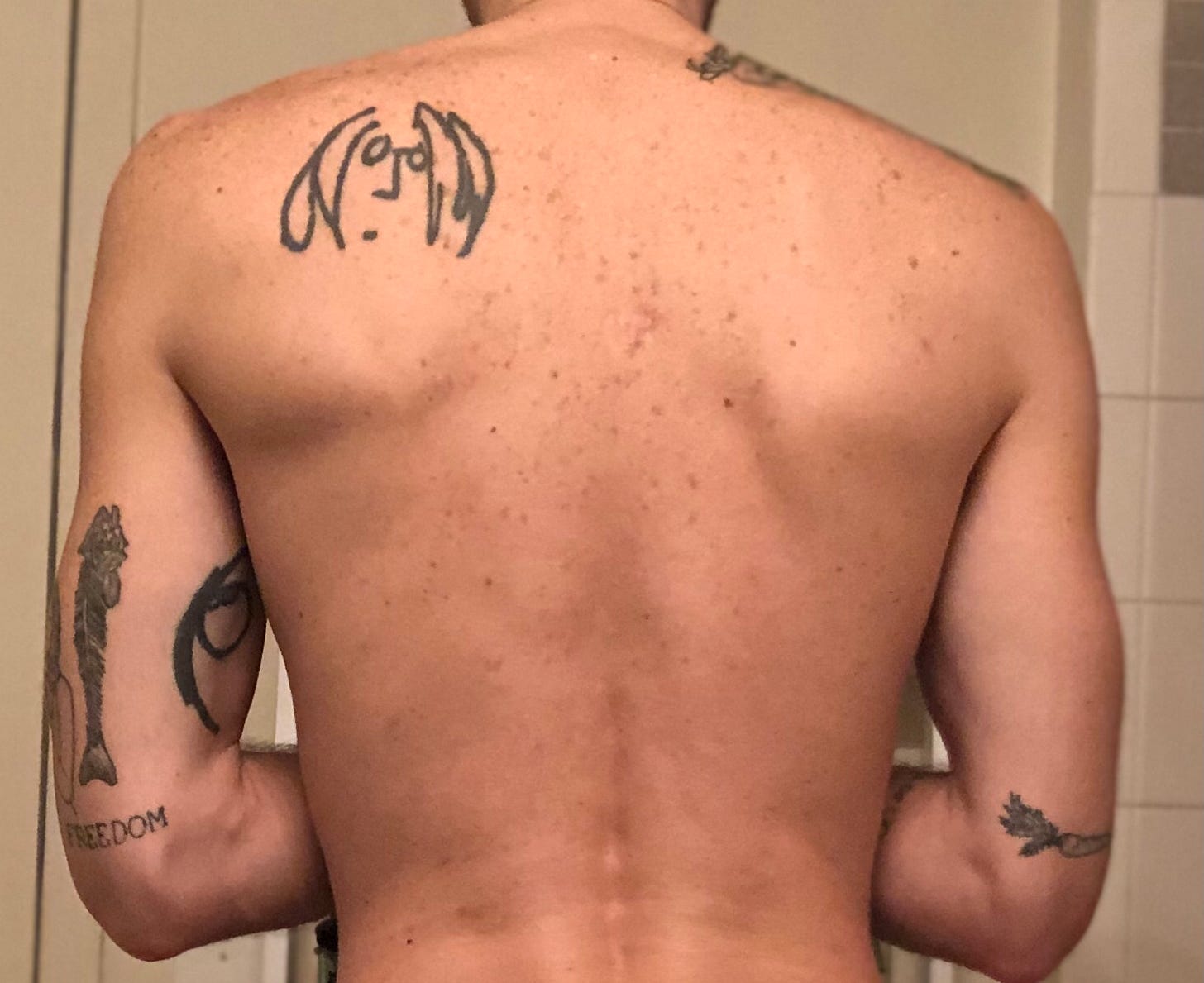All I Am Saying is Give Peace a Chance
how John Lennon taught me about the power of a person
Welcome to gangletown, where each week you’ll receive original essays, pieces of fiction, poetry, cultural commentary, or journalism written by David Kimple. If that is good for your vybe and you’d like access to everything gangletown has to offer, check out subscription options here.
Though it remains a mystery as to whether this is a family folktale or it happened in real life, the story goes that, when I was around three years old, my father would show me off to his friends by saying, “David, name the apostles."
I’d pridefully respond, “John, Paul, George, and Ringo.”
Dad got me hooked on The Beatles from early childhood with songs like “Strawberry Fields” and “The Continuing Story of Bungalow Bill,” a lesser-known song of theirs from their self-titled album The Beatles (aka the “White Album”). Somewhere around second grade, I bought that album on cassette at the mall with money from my chores, and it played it on a loop. In truth, I may have been one of the only kids at Tropical Elementary that would find equal comfort in watching primetime teen soap operas like Dawson’s Creek and movies like Yellow Submarine.
In the summer of 2007, I was nineteen years old. I was back in my hometown of Merritt Island after completing my freshman year of college, working at Applebee’s, and going through my first major break up. More than anything, the season was spent indulging in unlived cultural nostalgia with my friend Lindsey. Trapped on the island, a place we both dreamed of one day escaping in earnest, we were deeply invested in learning more about all of the real art that was out there. We spent evening after evening pining after the New York scene of yesteryear. We’d stay up all night and wax romantic about W.H. Auden and the beat generation. Or we’d paint like Jackson Pollock, only to ruin the carpets of her grandfather’s guest room. For the entire summer, we were floating blissfully in a bubble of pseudo-artistic pretentiousness, so when my Dad suggested that I watch a 2006 documentary called The U.S. vs. John Lennon, Lindsey and I were both very into it. We rented it from Blockbuster.
To be reductive, the film’s focus is less on John Lennon: the Beatle and more about John Lennon: the Activist. Sure, “Beatlemania” was incorporated (how could it not be?), but the film’s real motive was to paint Lennon’s fame in the late sixties and early seventies as almost unparalleled. The revelation of the movie, though, was centered around the turn of that decade when, as the Vietnam War was all the western world could talk about, John Lennon used his massive platform to share anti-war/pro-peace messaging. His impact was so strong that, amidst some of the most contentious years of American politics in the twentieth century, he was under surveillance by the FBI and nearly deported. Lennon was pushing ideologies like “Hair Peace | Bed Peace” while holding the title of public enemy number one.
In the film, a segment shows footage of the 1969 Anti-Vietnam Demonstration in Washington, D.C. - one of the largest anti-war protests in the United States - and the massive crowd seems to sing in unison over and over, “All we are saying is give peace a chance. All we are saying is give peace a chance.”
That scene, along with segments about the song’s origin (by way of John and Yoko’s highly publicized honeymoon Bed-ins for Peace), rattled me at my core. My childhood heart, which was shallowly connected to The Beatles because of my dad and our mutual love for their playful, catchy songs about octopus gardens, was suddenly changed. I saw John Lennon in an entirely new light. One man - and his community of lovers, friends, and collaborators - penned a lyric so simple and powerful that it, just a few months after its birth, caught the spirited tongues of thousands amidst what was one of the most passionate years of American history. One man, with an undeniably hopeful sentiment - that war is over if you want it - was seen as an enemy.
I had been a Beatles fan before, but at that moment, my heart was fortified with the essential elements of what Lindsey and I had been looking for that whole summer: the spirit of art, idealistic peace, and self-awareness.
After contemplating the film’s successes and failures, as well as weighing out whether we’d even enjoyed it, Lindsey and I lingered on the idea of one person’s impact. To me, the idea that a single voice could create such change was the key to a whole new life. I interpreted the potential for that kind of individual influence both as something to aspire to and fear. If John Lennon could say something so simple as “all we are saying is give peace a chance” and watch as it rippled around the world in real-time, changing the hearts of millions, then indeed anything could be possible.
All of this so moved me that I got a John Lennon tattoo early in the fall of my sophomore year. The piece sits on my back left shoulder blade, so I don’t see it often, but when I do, it ignites the sense-memory of my last teenage summer, swimming in artistic ideality and inspired by all the potential that the future could hold.
Now, nearly fourteen years since my Lennon-induced radicalization, I still would love nothing more than to gather up with 500,000 people in Washington D.C. and sing out those lyrics of change from deep in my bones.
My Dad recently said that he hadn’t felt the kind of tension we’re experiencing now between fellow Americans since the late sixties and the famous “Summer of 69”. I wish this were surprising. From everything that I can tell, the parallels between that era to today are plentiful and disturbing. There is one crucial difference, though. These days, when I think about the one person who’s influence is unparalleled, I don’t think of John Lennon, peace, or art. Woefully, I think about Donald Trump, division, and fear. Unlike Lennon’s messages of love and progress, Trump’s rhetoric seems centered around nothing but his own glory and power. It is a sobering reminder that the potential of one person’s influence is not reserved solely for those that are good of heart, honest, or peaceful in nature.
I like to imagine that, as the nation is split so confusingly down the middle, there is someone else out there, though. Surely there is one singular person with the power to bring people together in a healing song! Right?
If they are out there, I don’t know their name.
There may be a lesson in this. That when we look outward and see no singular idol, god, or savior ready to bring people together and fix things, we are left with just one option: ourselves. When we want to see change, movement, and creation, we have to take responsibility for it and trust that, though we are just one person at a time, one person can make a big difference.
What is my voice? What is my art? What is my protest? What is the message I create with my community that, if I am lucky, will ripple like a song in my neighbors’ voices? Will that be a song of harmony and hope? Or one of distancing and selfishness?
I’m not John Lennon, but I am also just one person. I have to believe that if he could inspire others for good, then I can too, in my own way.
Please enjoy this rendition of “Give Peace a Chance” as recorded with the Plastic Ono Band if you've never experienced it personally. It is a good reminder these days. We tend to problematize everything under the sun, but what we should really do is very simple.
Give Peace a Chance" - Plastic Ono Band (1969)
Ev'rybody's talking about
Bagism, Shagism, Dragism, Madism, Ragism, Tagism
This-ism, that-ism, is-m, is-m, is-m
All we are saying is give peace a chance
All we are saying is give peace a chance
C'mon
Ev'rybody's talking about Ministers
Sinisters, Banisters and canisters
Bishops and Fishops and Rabbis and Pop eyes
And bye bye, bye byes
All we are saying is give peace a chance
All we are saying is give peace a chance
Let me tell you now
Ev'rybody's talking about
Revolution, evolution, masturbation
Flagellation, regulation, integrations
Meditations, United Nations
Congratulations
All we are saying is give peace a chance
All we are saying is give peace a chance
Ev'rybody's talking about
John and Yoko, Timmy Leary, Rosemary
Tommy Smothers, Bobby Dylan, Tommy Cooper
Derek Taylor, Norman Mailer
Alan Ginsberg, Hare Krishna
Hare, Hare Krishna
All we are saying is give peace a chance
All we are saying is give peace a chance
All we are saying is give peace a chance
All we are saying is give peace a chance
Source: LyricFind
Songwriters: John Lennon
Give Peace a Chance lyrics © Sony/ATV Music Publishing LLC, BMG Rights Management
If you love what’s happening here, will you consider sharing this week’s gangletown (or another piece from the archives) directly with one person? Or - dare I say it? - two persons? It is the best way to help as gangletown grows. You can also follow & Tag me on social media @DKimps.



